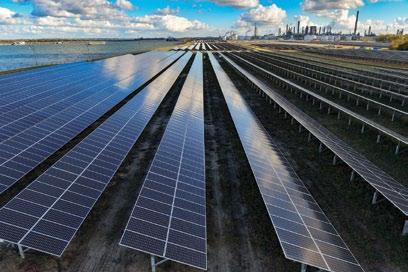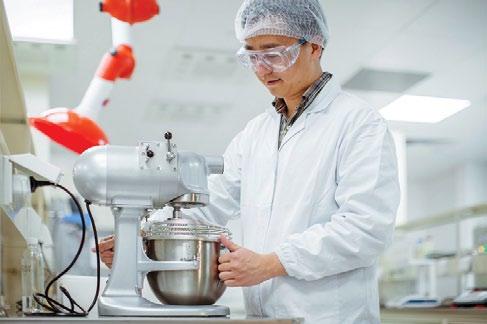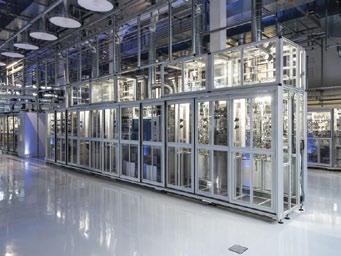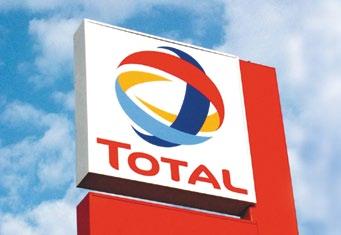
7 minute read
Chemicals & Petrochemicals news
NeWS
New developments in the Chemicals & Petrochemicals industry
Shell opens solar park at Shell moerdijk chemicals site in the Netherlands
Shell has opened one of the largest solar parks in the Netherlands at the Shell Moerdijk Chemical Plant. With 76,000 panels, the solar park has a peak capacity of 27 megawatts. The generated solar energy will be used to help power operations at Shell Moerdijk.
“Developing this solar power plant in Moerdijk fits within Shell’s ambition to play an active role in the Dutch energy transition,” says Marjan van Loon, president-director Shell Nederland. “We are eager to limit emissions through energy efficiency improvements of our processes and investments in new energy activities. To accelerate energy transition, it is important that we align our activities to the ideas and initiatives in society. We know dialogue and collaboration is the key to success.”
Robin Mooldijk, Executive Vice President for Manufacturing at Shell said: “At all Shell’s oil refineries and chemicals plants we are working to improve utilisation, energy efficiency and carbon intensity. Alongside process improvements and equipment upgrades, we also need vision and imagination. This solar park, now operational and helping to power our Moerdijk chemicals plant, is part of that.” Visit: www.shell.com
Wacker Chemie AG opened a new laboratory for food applications in Shanghai. This specialized lab will enable WACKER to provide its customers in Asia with even better support in developing innovative, customized products in the fast-growing food market. The focus is on food ingredients, for example for egg-free baked goods, whipped toppings or functional beverages, on dietary supplement ingredients such as highly bioavailable curcumin and on chewing-gum applications, for instance moldable sugar-free gum.
Asia’s food market is flourishing. China’s food industry, in particular, is profiting from the strong purchasing power of its middle class. At the same time, the sector must face new challenges. Consumers are attaching ever-greater importance to healthy and sustainable nutrition, as well as products that are quick and easy to prepare. “We offer solutions to challenges currently facing the food industry,” says Dr Gerhard Schmid, president of WACKER BIOSOLUTIONS. “With our new range of services in Shanghai, we are strengthening our position as an innovative partner to the food sector on the Chinese market.”
The new laboratory, which covers an area of some 150 square meters, focuses primarily on applications involving cyclodextrins, cyclodextrin complexes and cysteine, as well as chewinggum applications. Visit: www.wacker.com

A revolutionary change in vehicle panel production
SABIC has announced a new, cutting-edge technology for producing lightweight, costeffective and recyclable vehicle panels using its UDMAX™ tape, a unidirectional, fiber-reinforced thermoplastic composite. This innovative technology, which is designed to replace traditional panels made of metal and thermoset materials for interior and exterior automotive applications, will soon be commercialized in the bulkhead of a light commercial vehicle (LCV) produced in large scale for the global automotive market.
The bulkhead was developed through an international collaboration among SABIC; RLE International, an engineering services provider headquartered in the United Kingdom; AMA Composites, an Italian toolmaker; and Setex Textil GmbH, a weaver based in Germany.
Vehicle panels made with UDMAX tape combine strength and impact resistance with light weight, which can result in mass reduction of interior panels of up to 35 percent in comparison to metal parts. In case of exterior panels, the composite material can help reduce mass up to 50%. They are produced using a highly efficient, one-shot process of lamination and low-pressure molding. Visit: www.sabic.com
Solvay cuts emissions
Solvay is investing in a new biomass boiler at its soda ash plant in Rheinberg, Germany, a decision that will cut the site’s Co2 emissions by more than 30% while at the same time improving its competitiveness.
The new biomass boiler technology – which burns recycled wood chips – will lower Co2 emissions by 190 kt/year as the Group is committed to reduce its greenhouse gas emissions by 1 million tons over 2017-2025, regardless of its growth.
“Solvay with this key project marks a critical step in achieving its new greenhouse gas target as part of our strategy to produce and serve our customers in a more sustainable and competitive way. This biomass project follows earlier energy transition initiatives we launched at our soda ash sites in Bernburg and Rosignano and shows how we shape our future and reinforce our global leadership in soda ash,” said Christophe Clemente, President of Solvay Soda Ash & Derivatives Global Business unit. Visit: www.solvay.com
INDUSTRYNEwS
BASf opens innovative research center for catalysts and processes in Ludwigshafen


BASF has opened a pioneering research center at the heart of the Verbund site in Ludwigshafen, close to the famous Ammonia Lab. This new pilot plant facility for catalyst and process development will be operated by the global research unit Process Research & Chemical Engineering. It houses highly automated experimental facilities for efficient process development and testing of new process catalysts. The highlights of the modernized lab include modular construction of the testing facilities, the use of digital technologies to better visualize and manage the pilot plant facilities, and a digitalized working environment.
“With the increasing importance of the BASF segments Chemicals and Industrial Solutions, there is a growing need for product research and especially process research,” said Dr Detlef Kratz, head of the research unit Process Research & Chemical Engineering. “In our pilot plant facility, we are using state-of-the-art infrastructure to carry out experiments. This enables us to pursue new research approaches and reduce the length of research and development projects, while also continuing to improve the quality of the data collected. We are thus systematically pursuing our goal of increasing the likelihood of success of our projects.” Visit: www.basf.com Clariant, a focused and innovative specialty chemical company, and its Active Ingredients business hand cosmetics formulators the key to a revolution in anti-aging. New seaweed active ingredient Epseama pioneers the targeting of long non-coding RNA nc886 to improve signs of rejuvenate skin, reinvigorate its self-defense abilities and preserve skin youth.
Epseama takes an innovative and differentiated approach and goes down to the root cause adeing factors. It does so by targeting the long non-coding RNA, called “nc886”, recently recognized as a key regulator of PKR, a protein known for inducing premature aging in various diseases and organs. Subsequent groundbreaking research by Clariant Active Ingredients into the unexplored impact of nc886 in the skin, demonstrated the correlation between aging and the decrease of nc886 expression. The result: when properly expressed nc886 is a fundamental player in the rejuvenation of skin. With Epseama, the industry can develop effective skincare directed at the true causes of aging.
Derived from a “superfood of the sea”, Epseama draws on the extensive nutrient power of a brown seaweed Laminaria japonica (Kelp or Kombu) for its effectiveness. It is farmed off the coast of a South Korean island and involves “ugly-food” sourcing. Visit: www.clariant.com

Clariant Active Ingredients turns to a superfood of the sea
total acquires france’s Synova
Total has acquired Synova, a French leader in manufacturing high-performance recycled polypropylene for the automotive sector.
Synova produces 20,000 tonnes per year of polypropylene that meets the highest quality standards of original equipment manufacturers and automakers from recycled plastics. Combining Synova’s recycling expertise and Total’s polymers know-how will increase the supply of recycled polypropylene for automotive applications that deliver the same performance as virgin polymers. “By contributing to the lighter weight of vehicles, plastics improve their energy efficiency and reduce CO2 emissions. Producing them from recycled materials will also meet the challenge of managing their end of life,” explained Bernard Pinatel, President Refining & Chemicals, Total. “The acquisition of Synova is a concrete proof of our commitment to developing plastic recycling. It reinforces the activities we already carry out in recycling and contributes to Total’s ambition to be the responsible energy major.” Visit: www.total.com
INEOS Oxide to double capacity of its new Ethylene Oxide and Derivatives facility

INeoS oxide has announced that it is to double the size of its planned ethylene oxide (eo) and ethylene oxide Derivatives (eoD) facility to be built on the u.S. Gulf Coast. The new plant will produce 1.2 billion pounds of eo (circa 520kt). The plant is expected to be operational in 2023.
Ghislain Decadt, operations Director, INeoS oxide said, “Doubling the capacity of our planned ethylene oxide and Derivatives facility is a significant commitment in support our customers and their growth ambitions in the uS. This build allows us to address a fast growing eo merchant market as well as our own requirements. Combined with our upstream olefins capabilities this world class facility will secure our position as a reliable and competitive producer.” Visit: www.ineos.com










